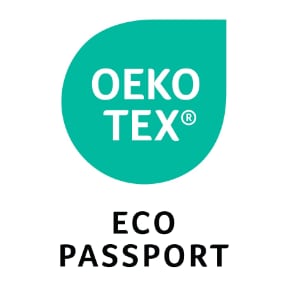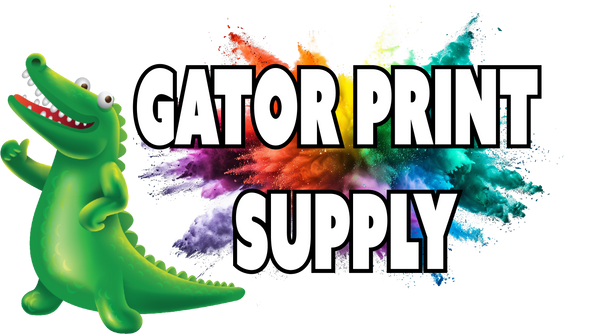
What is Oeko-Tex Certification for DTF Printing Consumables?
Share
In today’s textile, leather, and footwear industries, sustainability and environmental responsibility are more important than ever. Consumers are demanding products that are not only high-quality but also produced in a way that minimizes harm to the planet. For manufacturers and distributors of chemicals, pigments, and auxiliaries used in these industries, ensuring their products meet environmental and safety standards is crucial. That’s where OEKO-TEX® Eco Passport certification comes in.
The OEKO-TEX® Eco Passport certification is an important, globally recognized standard designed to test and certify chemicals, dyes, and other products used in the textile, leather, and footwear industries. It focuses on products that have a lower environmental impact by meeting rigorous criteria, ensuring that they are safer for both the environment and the people who come into contact with them. Let's dive deeper into what this certification entails and why it matters.
The Importance of the Eco Passport Certification
OEKO-TEX® Eco Passport certification ensures that chemicals used in textile and leather production processes are tested for harmful substances and meet strict environmental standards. The certification process requires testing for compliance with global regulations and aims to promote greener chemistry that results in cleaner, safer products.
The Eco Passport certification is designed for manufacturers and distributors of chemicals used in the production of textiles, leather, and footwear. The chemicals involved in this process include not only the traditional dyes and colourants but also the various auxiliary chemicals used in finishing treatments, coatings, and other fabric manipulations.
With this certification, companies can demonstrate their commitment to sustainability and environmental stewardship. It ensures that the chemicals they use are rigorously tested against the most up-to-date environmental standards and that their products are aligned with international regulations and consumer expectations.
What Chemicals Can Be Certified?
The OEKO-TEX® Eco Passport certification covers a wide range of chemicals, including:
- Dyes and colorants: Chemicals used to add color to textiles and leather products.
- Auxiliary chemicals: These include the chemicals used in fabric finishing, coatings, and other treatments that modify the texture, appearance, or durability of the material.
- Textile and leather chemical compounds: These are the chemical formulations used for various textile and leather applications across industries like apparel, footwear, and home textiles.
If these chemicals meet the criteria set by OEKO-TEX®, they are granted Eco Passport certification, making it easier for manufacturers to source sustainable and safe ingredients for their products.
Key Benefits of Eco Passport Certification
There are numerous benefits associated with obtaining OEKO-TEX® Eco Passport certification. For both manufacturers and consumers, this certification provides an essential assurance of product safety, environmental responsibility, and regulatory compliance. Here are some of the key advantages:
1. Global Regulatory Compliance
OEKO-TEX® Eco Passport certification ensures that certified chemicals comply with international regulations, such as:
- Annexes XVII and XIV of the REACH (Registration, Evaluation, Authorization, and Restriction of Chemicals) Directive.
- The CPSIA (Consumer Product Safety Improvement Act).
- The ECHA-SVHC (European Chemicals Agency – Substances of Very High Concern) candidate list.
Compliance with these regulations is vital for ensuring that chemicals do not contain harmful substances, protecting both the environment and human health. Eco Passport certification helps businesses avoid costly regulatory issues and ensures their products can be marketed globally.
2. Recognition by ZDHC
The Zero Discharge of Hazardous Chemicals (ZDHC) program recognizes Eco Passport certification from Level 1 to Level 3. ZDHC is an important initiative in the textile industry that focuses on eliminating hazardous chemicals from the supply chain. Certification under the Eco Passport program makes it easier for manufacturers to align with the ZDHC's goals and reduces the risk of using harmful substances in production processes.
3. Access to Key Databases
Certified chemicals are listed in various recognized databases, making it easier for manufacturers and buyers to source responsible chemicals and materials. These include:
- The OEKO-TEX® Buying Guide.
- The ZDHC Gateway.
- The GoBlu BHive App.
These databases provide access to a network of more than 35,000 certified companies worldwide, helping businesses identify trusted suppliers that meet sustainability goals and regulatory requirements.
4. Cost Efficiency with Modular Certification System
One of the unique aspects of the Eco Passport certification is its modular system. This system includes three different certification stages, tailored to meet the specific needs of manufacturers and distributors.
Moreover, Eco Passport certification is recognized as a pre-certification for other OEKO-TEX® certifications, such as STeP (Sustainable Textile Production), STANDARD 100, ORGANIC COTTON, and LEATHER STANDARD. This means that businesses can streamline their certification process and potentially reduce testing costs, making it a cost-effective choice for companies looking to prove their commitment to sustainability.
5. Stronger Sustainability Practices
For businesses in the textile, leather, and footwear industries, obtaining OEKO-TEX® Eco Passport certification is an excellent way to reinforce their commitment to environmental sustainability. By using certified chemicals, manufacturers can reduce the environmental impact of their production processes and ensure that their products are safe for consumers.
The Future of Sustainable Textiles
The OEKO-TEX® Eco Passport certification is a step toward a more sustainable textile and leather industry. As consumer demand for environmentally responsible products grows, certification programs like Eco Passport help guide manufacturers in making more sustainable choices and meeting the expectations of conscious consumers.
Furthermore, as regulatory frameworks around the world become stricter regarding chemical usage, the Eco Passport certification offers a clear pathway for compliance. By obtaining Eco Passport certification, companies not only demonstrate their commitment to sustainability but also position themselves as leaders in the growing green economy.
Conclusion
In a world that’s increasingly focused on sustainability, OEKO-TEX® Eco Passport certification is an invaluable tool for businesses in the textile, leather, and footwear industries. By using chemicals that meet the highest environmental standards, companies can ensure they are contributing to a cleaner, safer planet.
Whether you’re a manufacturer, distributor, or brand committed to offering eco-friendly products, Eco Passport certification provides peace of mind and reinforces your commitment to sustainability. With its rigorous testing, regulatory compliance, and recognition by key industry standards, Eco Passport helps pave the way for a cleaner, greener future in textiles and leather production.
If you’re looking to make more environmentally conscious choices in your supply chain, the OEKO-TEX® Eco Passport is a certification you can trust to help you get there.
